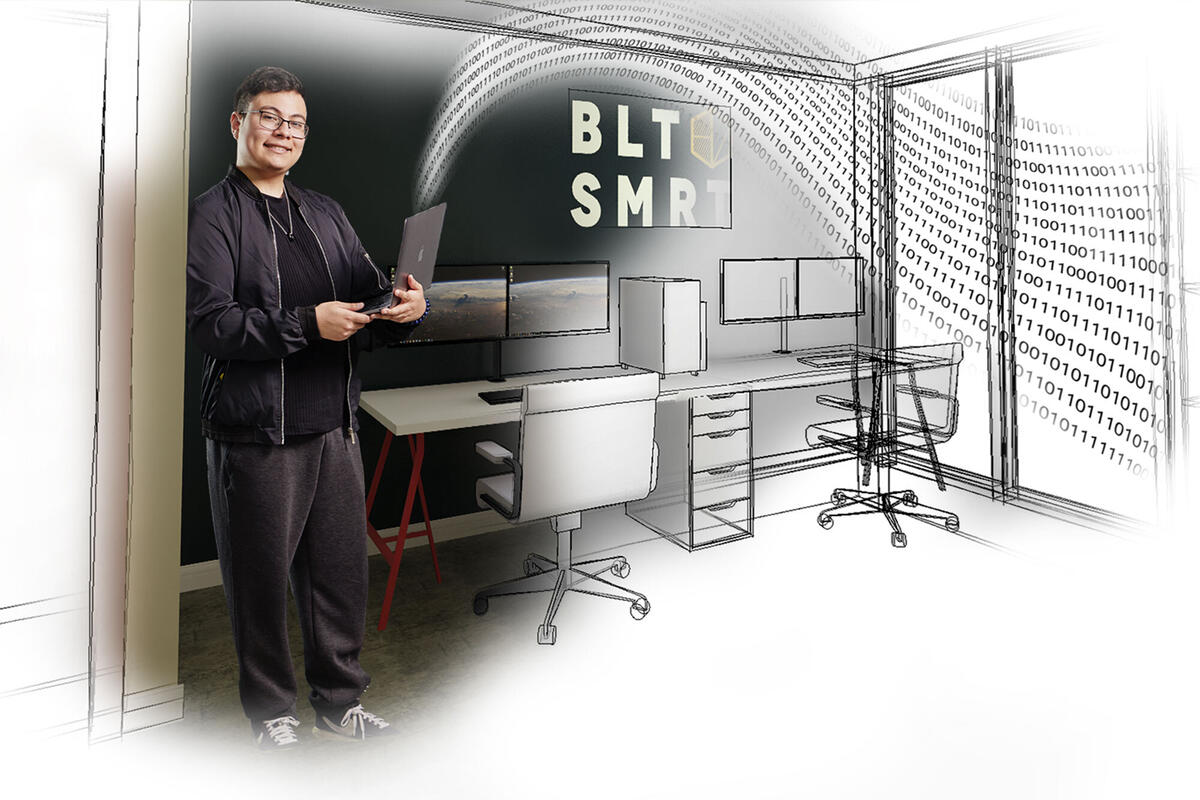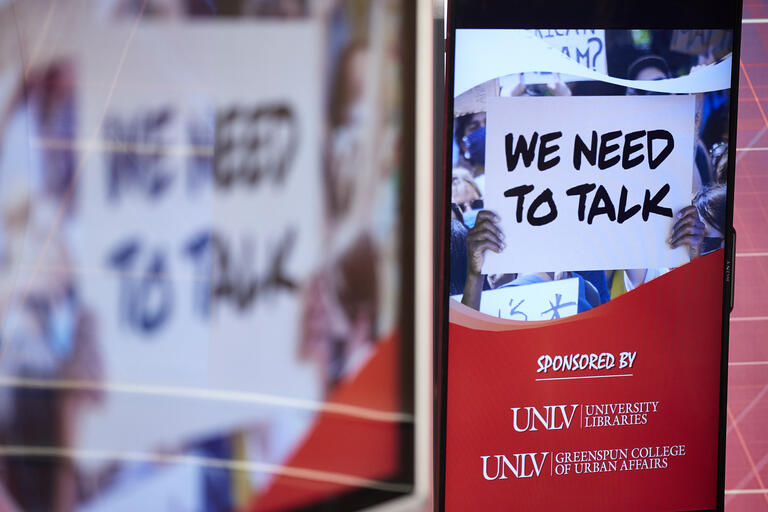The family cleaning business was struggling to get noticed on Yelp. Prospective clients were sending multiple messages a day and sometimes overnight, making it difficult for Marcos Kano and his parents to respond in a timely manner.
But Kano — a budding software engineer and then-Nevada State High School student — had an idea. The self-taught coder developed software to generate an automatic response when a lead came through, giving his parents more time to develop a personalized follow-up and gain a new client.
“It’s been great,” said Kano whose parents moved the family from Brazil seven years ago to provide him with better educational opportunities. “We are needing more people to work for us because we’re getting too many clients.”
Kano is now a junior at UNLV double majoring in computer science and math. His creative solution catapulted the business to a higher ranking, led to a 40% increase in leads, and set him up for success as an applicant to StepUp & StartUp (SUSU) — a first-of-its-kind internship program at UNLV that connects entrepreneurial-minded students like Kano with technology startups in the Las Vegas Valley.
The program, housed in the College of Engineering and funded by the Nevada Governor’s Office of Economic Development, reimburses employers for the student’s paid internship — an opportunity that isn’t always guaranteed with small technology startups.
“If we provide opportunities for our students, they will get the experience they need, and our technology businesses will then be able to hire qualified and experienced graduates,” said Alejandro Chacon, who leads the program as the engineering school’s internship coordinator. “This program is just one step to growing the technology industry in Nevada.”
StepUp & StartUp, which launched in February 2023, is coming off of a strong first year. Bolstered with $4 million from GOED, UNLV and the University of Nevada, Reno were tasked with standing up respective programs in an effort to retain top engineering and science talent in the Silver State.
In its inaugural year, the UNLV program provided internships — at a competitive $18 an hour — for 50 UNLV College of Engineering students and supported 24 local startup tech companies.
“For our technology industry to grow, there has to be a qualified pool of candidates so our businesses can hire locally,” Chacon said. “By helping startups, we support growth and support more jobs for our students.”
Advising support for landing internships
The SUSU program was welcome news for 18-year-old Kano, who learned about the opportunity on orientation day. With his associate’s degree in hand, thanks to his education at Nevada State High School, Kano arrived on campus as a junior and was immediately eligible for the new program.
“I was looking for a step in the door to get a start in software engineering, and that’s when they recommended me to SUSU,” he said. “They shared that SUSU makes it easier to get a paid internship since the companies are getting reimbursed by UNLV. I loved the idea and decided to apply.”
He quickly got connected with Chacon, who assisted with all things job prep: resume writing, developing his LinkedIn page, and mock interviews. Chacon also advised Kano to improve his online portfolio.
Soon, Kano was ready to apply to an open position with Arete Games, Inc. a local startup.
“We talked about what questions would pop up in the interview,” Kano said. “I trained for all of the questions they asked me, so I was expecting them. It was a really smooth process.”
Kano recently finished his 12-week internship with Arete Games, where he helped the company develop a new way to create a game engine, which enables developers to “sketch” a video game. The company recently debuted a mobile game called “Arete: Spacer,” which showcases the performance of the new game engine.
“A game engine is a framework to create games faster and make them more efficiently,” Kano said. “Their approach is a little different than you see elsewhere.”
Building skills and relationships for post-grad success
The opportunity to have an outsized impact during an internship experience like Kano’s is more likely to happen in a small company or startup environment, and is a unique benefit of SUSU, according to Zach Miles, senior associate vice president for economic development at UNLV.
“A small business is relying on the expertise of the student, and many times, the student is helping to share the future of the company and is involved in not only their degree expertise,but may be exposed to management, innovation, problem solving, and learning what it takes to run a small business,” Miles said. "That individual becomes invaluable to that company, an even better employee for a large company having been exposed to many different opportunities, and may even catch the entrepreneurial bug and start their own small business in the future.”
Kano agreed.
“The best part of working in the startup environment is that you’re really close with the CEO, the CTO, the founders. And a lot of times you’re working directly with them, and they become your mentor,” he said. “You build meaningful relationships with them, you get recommendations, you get references, and, after you graduate, you might be able to rely on those relationships to land a junior job.”
About halfway into his second internship through the program, Kano is building relationships with his mentors at BLT SMRT, LLC, a local tech company that’s developing software solutions to help architects, engineers, and construction (AEC) companies streamline their workflows to save money and time.
Kano is working on developing the web-portal for the startup’s newest application, Maestro. It is an add-in for Autodesk Revit, a software that helps the AEC industry design, build and maintain buildings. It focuses on enabling end-users to be able to create their own custom tools.
According to Ben Preston, technology lead at BLT SMRT, their application has only become possible in the past few years with the maturing of large language model technologies and their ability to output working code. Before this, users would have to learn traditional programming languages, such as C# or Python, or learn specialty graphical-programming languages, he said.
“Both have demanding learning curves,” Preston said. “The web portal that Marcos is focused on is integral to allowing end-users to share their custom tools to their coworkers, essentially turning architects and engineers into their own software developers.”
Kano said the experience is a key differentiator for students in a popular major like computer science, which helps them stand out in the highly competitive tech job market.
“I saw Arete’s job post and what they wanted, and before I applied, I tried to get some experience in everything they wanted. I learned 3D modeling, I coded in another language that they liked, just to get refreshed,” Kano said. “All of those things are key. If you graduate without internships, at best, you’re on par with everyone else. You’re not going to win unless you seek out these opportunities.”
He’s definitely ahead of the curve. By the end of the program, he’ll have at least two years of on-the-job experience.
In addition to SUSU, schoolwork, and assisting his family business, Evidence Cleaning, Kano also recently joined the DataX Lab in the new Advanced Engineering Building as an undergraduate researcher. The lab, run professor Mingon Kang, aims to develop novel and efficient algorithms to solve challenging computational problems in Bioinformatics and Big Data Analytics.
Kano is also a part of the Dream.US scholarship program, which he views as a “third academic advisor.” They’re helping him prepare his CV and application for the PD Soros Fellowship for New Americans — a fellowship that could help him with his dream, and his family’s dream, of attending Stanford University for his master’s degree.
“I think, everywhere I’ve been, I’ve put all of myself into it and I’ve gotten so much out of it,” Kano said. “I think it’s really worth it.”



